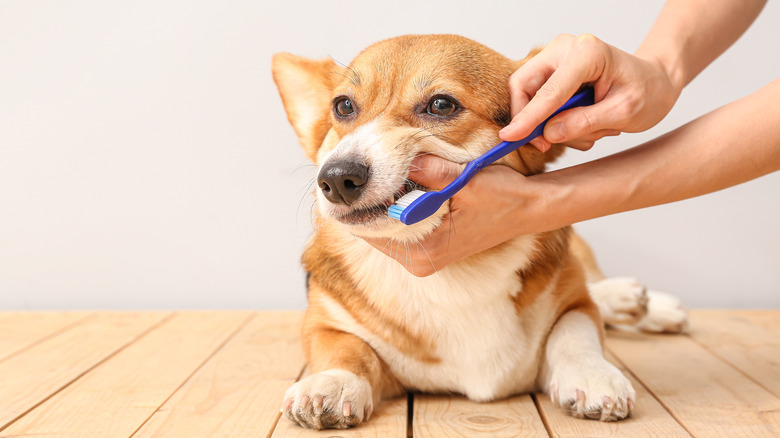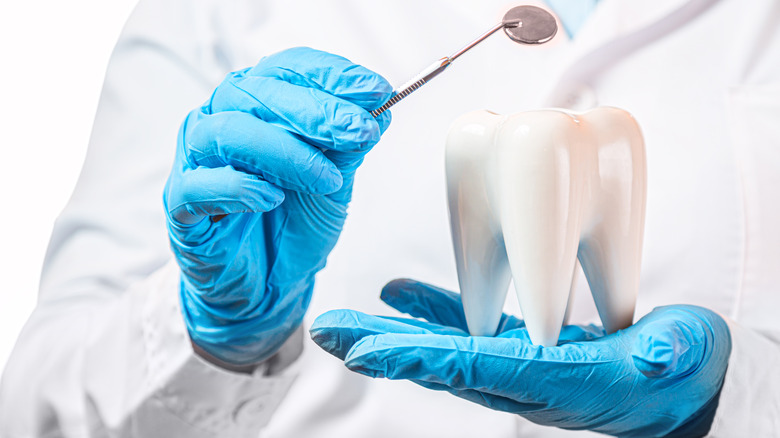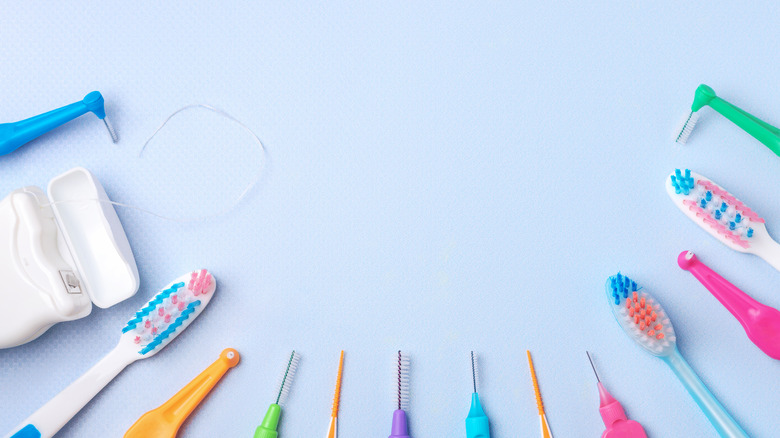The Common Oral Health Mistake That Dentists See All The Time
What do Zac Efron and Vanessa Hudgeons have in common with a microbiome? They both are famous for being "all in this together," *overhead clap*. If you're sitting there thinking you've aged out of "High School Musical" references, it's okay ... so have we, and we're sorry about it.
The National Human Genome Research Institute defines a microbiome as a collection of microorganisms (think: fungi, bacteria, viruses, etc.) that are specific to a particular environment. Microbiomes are like a community or ecosystem of sorts: a collection of symbiotic creatures that work better together than alone (University of California, Berkeley). And you and your body are the oh-so-gracious hosts to several very important ones.
In recent years, the gut microbiome has become the talk of the town. The European Society of Gastroenterology and Motility asserts that our gut health is linked to the health of major organs, such as skin, brain, and heart. But we are home to another hugely important microbiome, and we (probably along with your dentist) think it's time it stops getting the Jan Brady treatment. Let's talk about your oral microbiome.
What's the deal with the oral microbiome?
A 2019 study published in Food Science and Human Wellness describes the oral microbiome as the second largest in the body after the gut and home to over 700 different kinds of bacteria that dwell in the tiny habitats made up of the tongue, teeth, gums, buccal mucosa, tonsils, throat, and palette. As with the gut, oral bacteria are there working for you — protecting your teeth from acid, maintaining your mouth's pH balance, and warding off bad bacteria. But it's a delicate balance, and when things go wrong, more than just your pretty smile and fresh breath are at risk.
The American Society for Microbiology describes the oral cavity as the gateway to the rest of our bodies and the beginning of our digestive tract. Food, of course, enters through the mouth and then slides down the esophagus, into the stomach, and through the intestines. Oxygen is pulled in through our nose and mouth and sent to the lungs. Foreign bodies are entering through the oral cavity all day long. When they disrupt the oral cavity directly, it can cause oral diseases like tooth decay, gum disease, and tonsillitis. But there is now evidence that links upset in the oral cavity to systemic ailments such as heart disease, stroke, preterm birth, diabetes, and pneumonia.
How to keep your oral microbiome in tip-top shape
Dentists often see disease as the result of oral cavity neglect, but there are steps you can take to ensure your mouth — and your whole body — is a happy ecosystem. According to MindBodyGreen, flossing is the most important thing you can do to have a healthy mouth. Every night, before brushing your teeth, get in the habit of flossing first. If you see some bleeding, that's a pretty good indicator that your gum health is not where it should be. Keep up with daily flossing and watch as your gum health and breath begin to improve. Speaking of breath, dentists also suggest limiting the amount of mouthwash or essential oils you introduce into your nightly repertoire, as the alcohol in them can kill healthy bacteria that your body needs.
Instead of giving good bacteria the boot, you might try nourishing it with oil pulling. Originating thousands of years ago from Ayurveda, an ancient Pacific Indian science, oil pulling is very simply the act of swishing oil (usually sesame or coconut or olive oil) around your mouth for up to five minutes (though 15 minutes is ideal) before spitting it out (via Kerala Ayurveda). Oil pulling detoxifies the mouth and the whole body by stimulating salivary enzymes that absorb an array of chemical, bacterial, and environmental toxins, per a 2017 review published in the Journal of Traditional and Complementary Medicine.



